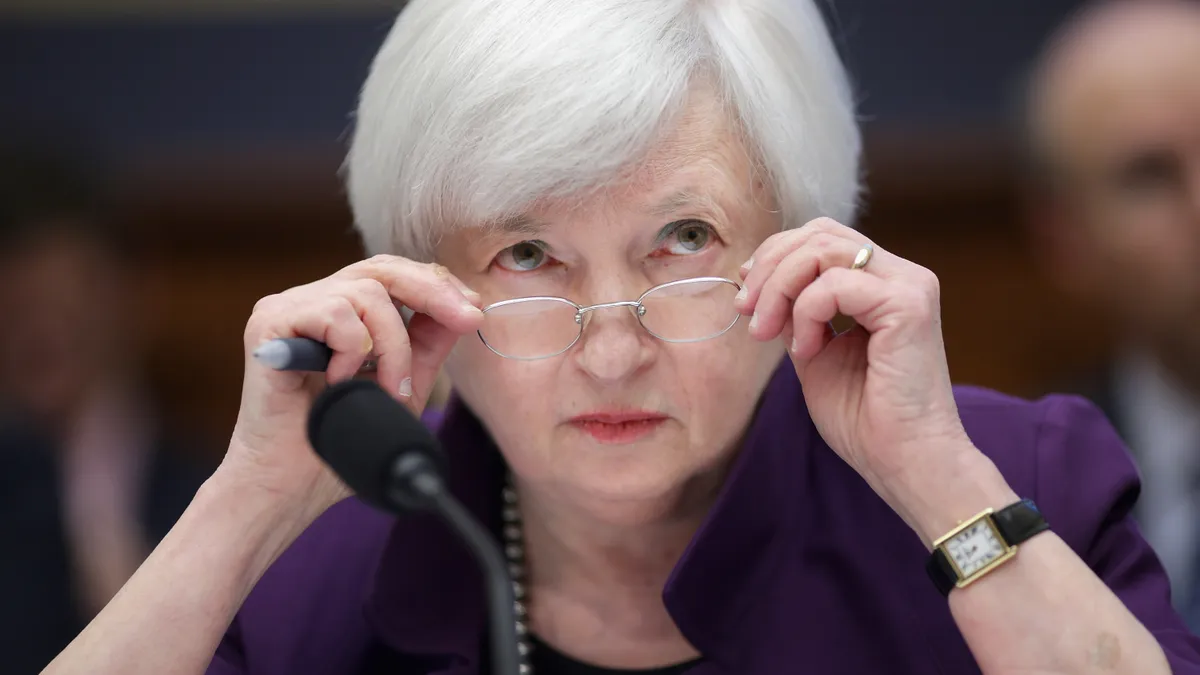Dive Brief:
- Losses in commercial real estate may leave financial institutions “quite stressed” as loans come due, vacancy rates in some cities persist at high levels, and interest rates hover at a 23-year-high, Treasury Secretary Janet Yellen said Tuesday.
- Federal regulators are trying to ensure that banks troubled by loans to commercial property owners hold adequate liquidity, trim dividends if needed and build loan-loss reserves, Yellen said in testimony to the House Financial Services Committee.
- “The higher interest rate environment and, in some cases — particularly the case of office buildings — shifts in work patterns due to the pandemic coupled with many commercial real estate loans coming due and needing to be financed, refinanced in a context where vacancy rates in some cities are quite high — it's going to put a lot of stress on the owners of these properties,” Yellen said. “So the banking agencies are very focused on helping the banks manage through these situations.”
Dive Insight:
Top U.S. regulators in December flagged the commercial real estate market as a leading risk to financial stability this year, noting rising vacancy rates, declining values of office properties, high interest rates and the possibility of an economic slowdown.
“CRE is the largest loan category among almost one-half of U.S. banks, and more than one-quarter of U.S. banks have CRE loan portfolios that are large relative to the capital they hold,” the Financial Stability Oversight Council said in an annual report in December. “The office sector faces the most severe challenges because demand for office space has been weak, particularly in the largest U.S. markets.”
Although stable after the failures of Signature, First Republic and Silicon Valley Bank last year, parts of the banking system may encounter more turmoil because of vulnerability to commercial real estate, Loretta Mester, president of the Federal Reserve Bank of Cleveland, said Tuesday.
Since March, “many banks have diversified their sources of liquidity, making them less vulnerable,” Mester said in a speech. “But stress could come again to banks that continue to rely on uninsured deposits for their funding while having sizable exposures to CRE assets that will need to be repriced at higher interest rates.”
Bank supervisors can probably limit any banking turbulence related to commercial real estate, Yellen said, while emphasizing the regulatory focus on the risks.
“I’m concerned,” she said in response to a lawmaker’s question. “I believe it’s manageable, although there may be some institutions that are quite stressed.”
As the work-from-home trend erodes demand for office space, many owners of commercial property that borrowed earlier this decade at interest rates close to zero need to refinance at much higher rates.
The stress on balance sheets is high at some financial institutions, Yellen said.
“Many — especially smaller and regional banks — have concentrations of commercial real estate lending,” she said. “I think office properties in some cities are of special concern, because vacancy rates have increased, and there have been declines in property value.”
New York Community Bank last week rekindled fear of turmoil among regional banks after reporting a fourth-quarter loss and cutting its dividend.
NYCB said it was reinforcing capital after having bought the assets and liabilities of Signature Bank. The purchase pushed NYCB’s total assets above $100 billion, subjecting it to tougher capital and liquidity rules.
“The bank had bought the assets of Signature and that moved them up into a higher category where there's a little more scrutiny and some higher capital requirements,” Austan Goolsbee, president of the Federal Reserve Bank of Chicago, said Monday.
“Thus far, that doesn't really seem like it's commercial real estate blowing up or something like that,” Goolsbee told Bloomberg. “But of course we're monitoring. ... The job of a central banker is to monitor everything that can go wrong and to prepare yourself for it.”
Fed officials are among the regulators that sit on the FSOC.















